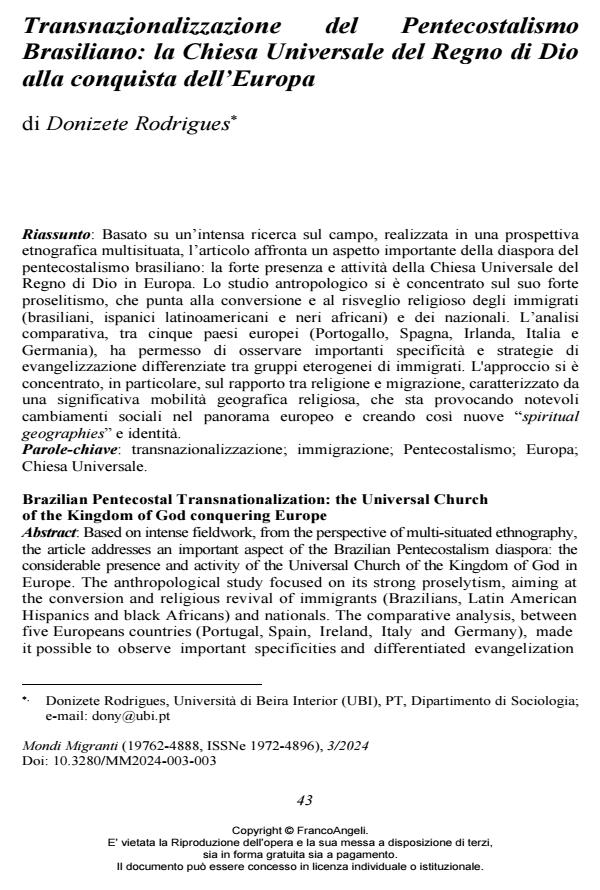Brazilian Pentecostal Transnationalization: the Universal Church of the Kingdom of God conquering Europe
Journal title MONDI MIGRANTI
Author/s Donizete Rodrigues
Publishing Year 2024 Issue 2024/3
Language Italian Pages 17 P. 43-59 File size 206 KB
DOI 10.3280/MM2024-003-003
DOI is like a bar code for intellectual property: to have more infomation
click here
Below, you can see the article first page
If you want to buy this article in PDF format, you can do it, following the instructions to buy download credits

FrancoAngeli is member of Publishers International Linking Association, Inc (PILA), a not-for-profit association which run the CrossRef service enabling links to and from online scholarly content.
Based on intense fieldwork, from the perspective of multi-situated ethnography, the article addresses an important aspect of the Brazilian Pentecostalism diaspora: the considerable presence and activity of the Universal Church of the Kingdom of God in Europe. The anthropological study focused on its strong proselytism, aiming at the conversion and religious revival of immigrants (Brazilians, Latin American Hispanics and black Africans) and nationals. The comparative analysis, between five Europeans countries (Portugal, Spain, Ireland, Italy and Germany), made it possible to observe important specificities and differentiated evangelization strategies between heterogeneous groups of immigrants. The approach focused, in particular, on the relationship between religion and migration, characterized by significant religious geographic mobility, which has been causing significant social changes in the European panorama and thus creating new “spiritual geographies” and identities.
Keywords: transnationalization; immigration; Pentecostalism; Europe; Universal Church.
- Anderson A. (2004). An Introduction to Pentecostalism: Global Charismatic Christianity. Cambridge: Cambridge University Press.
- Appadurai A. (1996). Modernity at Large: Cultural Dimensions of Globalization. Mineapolis: University of Minnesota Press.
- Berger P. and Luckmann T. (1967). The Social Construction of Reality : a treatise in the sociology of knowledge. Oxford : Blackwell.
- Bourdieu P. (1987). Choses Dites. Paris: Minuit.
- Bourdieu P. (1986). Economia das Trocas Simbólicas. São Paulo: Editora Perspectiva.
- Chesnut A. (1997). Born Again in Brazil: the pentecostals boom and pathogens of poverty. London: Rutgers University Press.
- Coleman S. (2000). The Globalization of Charismatic Christianity: spreading the gospel of prosperity. Cambridge: Cambridge University Press.
- Corten A. and Fratani R., eds. (2001). Between Babel and Pentecost: Transnational Pentecostalism in Africa and America. London: Hurst.
- Davie G. (2002). Europe - the exceptional case: parameters of faith in the modern world. London: Darton Longman & Told.
- Ebaugh H. (2003). “Religion and the New Immigrants”. In: Dillon M., ed., Handbook of the Sociology of Religion. Cambridge: Cambridge University Press.
- Fer Y. (2007). Pentecôtisme et Modernité Urbaine: entre déterritorialisation des identités et réinvestissement symbolique de l’espace urbain. Social Compass, 54, 2: 201-210; doi 10.1177/0037768607077031.
- Freston P. (2010). Reverse Mission: A discourse in search of reality? PentecoStudies, 9, 2: 153-174; doi 10.1558/ptcs. v9.i2.8948.
- Freston P. (2001). Evangelicals and Politics in Asia, Africa and Latin America. Cambridge: Cambridge University Press
- Freston P. (1999). A Igreja Universal do Reino de Deus na Europa. Lusotopie, 1, 2: 383-403.
- Lévi-Straus C. (1962). La Pensée Sauvage. Paris: Plon.
- Geertz C. (1973). The Interpretation of Cultures. New York: Basic Books.
- Hall S. (1990). “Cultural Identity and Diaspora”. In: Rutherford J., ed., Identity: Community, Culture, Difference (pp. 222-237). London: Lawrence and Wishart.
- Hardy E. (2022). Beyond Belief: how Pentecostalism Christianity is taking over the World. London: Hurst.
- Machado F.L. (1997). Contornos e especificidades da imigração em Portugal. Sociologia - Problemas e Práticas, 24: 9-44.
- MacHarg K. (2008). Spain’s Awakening: is revival around the corner for Spain?. Latin American Mission (report).
- Marcus G. (1995). Ethnography in/of the World System: The Emergence of Multisited Ethnography. The Annual Review of Anthropology, 24: 95-117;
- Mariz C. (2009). Missão religiosa e migração: ‘novas comunidades’ e igrejas pentecostais brasileiras no exterior. Análise Social, XLIV, 1º: 161-187.
- Martin D. (2002). Pentecostalism: the world their parish. Oxford: Blackwell.
- Maskens M. (2012). Spiritual Geographies: mobility of Pentecostal ministers and migratory ‘miracles’ between Africa or Latin America and Europa. Brussels Studies, 58: 0-11;
- Oro A.P., org. (2024). Fluxos Religiosos Transnacionais. Brasilia: ABA Publicações.
- Oro A.P. e Rodrigues D., eds. (2015). A Transnacionalização Religiosa: religiões em movimento. Porto Alegre: Cirkula.
- Oosterbaan M., Kamp L. and Bahia J., eds. (2020). Global Trajetories of Brazilian Religion: Lusospheres. New York: Bloomsbury.
- Pérez-Agote A. (2010). Religious Change in Spain. Social Compass, 57, 2: 224-234; DOI: 10.1177/0037768610362413
- Rocha C. and Vásquez M., eds. (2013). The Diaspora of Brazilian Religions. Leiden: Brill.
- Rodrigues D. (2023). How to Study Religion? Notes on research methodology in the context of Latin American Religions. International Journal of Latin American Religions, 7, 1: 1-19;
- Rodrigues D. (2019). Evangelical Identities in the Brazilian Diaspora: a sociological approach. Portuguese Studies Review (Special Issue - Memory, identity and social representations in the Lusophone world), 27, 1: 11-25.
- Ruuth A. e Rodrigues D. (1999). Deus, o Demónio e o Homem: O Fenómeno Igreja Universal do Reino de Deus. Lisboa: Colibri.
- Sahlins M. (1997). O ‘pessimismo sentimental’ e a experiência etnográfica: por que a cultura não é um ‘objeto’ em via de extinção. Mana, 32, 2: 103-150; DOI: 10.1590/S0104-93131997000200004
- Santiago J. (2010). La dimension conséquentielle et la nouvelle pluralité religieuse de l’Espagne actuelle. Social Compass, 57, 1: 3-14; DOI: 10.1177/003776860935554
- Silva M.A. (2013). Dinâmicas da Migração Brasileira e Crise do Welfare State na UE pós-2008: uma etnografia a partir de Roma e Barcelona. Recife: Universidade Federal de Pernambuco, Tese de Doutorado em Antropologia Social.
- Velho O. (2009). Missionization in the Postcolonial World. A view from Brazil and elsewhere. In: Csordas T., ed. Transnational Transcendence. Essays on Religion and Globalization. Berkeley: University of California Press.
Donizete Rodrigues, Transnazionalizzazione del Pentecostalismo Brasiliano: la Chiesa Universale del Regno di Dio alla conquista dell’Europa in "MONDI MIGRANTI" 3/2024, pp 43-59, DOI: 10.3280/MM2024-003-003